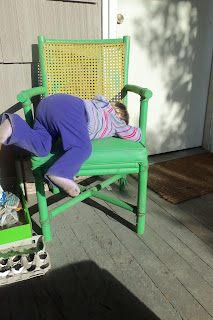Babies and the Boob Tube

March 3, 2009, 4:20 pm
Babies and the Boob Tube
By Lisa Belkin
The bad news is, you may have wasted your money.
The good news is, you probably didn’t do any harm.
That is the take-away from report on whether all those “educational” videos, which claim to make baby smarter, make any difference at all.
In this month’s Pediatrics, researchers at the Center on Media and Child Health at Children’s Hospital in Boston, and Harvard University, report the results of their study in which 872 children were assessed at semi-regular intervals from birth up to the age of three. The mothers of the children filled out questionnaires about how much time the children spent watching television, which turned out to be an average of 1.2 hours a day.
The American Academy of Pediatrics (which publishes the journal in which this report appeared) has spent ten years advising against any television for this age group, but that doesn’t seem to have resulted in a ban on television in most homes. According to the report, “68 percent of children 2 years of age use screen media on a typical day and and one quarter of these children have a television set in his or her bedroom.”
Parents do this in part because they believe that certain programs and videos are educational, and “good for the brain” the report says, a belief that was the catalyst for the study. “Given the large number of infants who are regularly exposed to TV, and the large number of parents who believe that it is good for their development,” the report says, “it is important to determine the effects of TV viewing on the developing cognition of young children.”
In other words, parents think they are making their children smarter.
Are they? Probably not.
After adjusting the data for such factors as the age, marital status, education level, income and presence of siblings, the data showed that the children who watched educational television were no more adept in vocabulary or visual and motor abilities tests than those who had not.
“I don’t know why people think TV is good for babies. It’s probably the way those products have been marketed,” said Marie Evans Schmidt, a research associate at the Center and the study’s lead author.
But here’s what else the study showed: contrary to what the researchers had expected to find, those babies weren’t WORSE off, either. To quote the report, television viewing was “neither beneficial nor deleterious to child cognitive and language abilities.”
In today’s Science section, in an article that at firsts seems unrelated, my colleague Natalie Angier writes about how so much of what makes us human comes from our practice of handing off our children to others for care. Momma chimps won’t let go of their babies for a moment for a full six months, she reports, while humans hand the newborn over to grandparents, aunts, friends and caregivers almost from the start. It is the reason chimps give birth, on average, every six years and humans every three, she writes.
And she concludes, though not in these exact words, it is the only thing that keeps human mothers sane.
Cave moms probably always had a spare set of hands ready to hold the baby for awhile, but modern mothers, living further from their own parents and siblings, don’t. (If you are about to write and tell me I am ignoring fathers, I’m not; all the research I’m talking about here looked at mothers.) For some of these mothers, the downtime – to take a shower, cook dinner – comes from a box that flashes and sings.
If you are buying special videos for that box designed to prep a very young child’s brain for Harvard, save your money, the Harvard researchers say. But if you are using the box for their entertainment and your sanity, stop feeling guilty.
There are other reasons not to plop a baby in front of the tube for hours on end, Schmidt warns. “Although our study showed no evidence of harm, parents should be aware that infants watching TV may be at risk of obesity, sleep disturbances and possibly attention problems,” she says. “We don’t want this study to be viewed as a license for babies to watch TV because they won’t be harmed.”
Not a license, perhaps, but permission for a little bit of slack

yes, i read the articles, but...
ReplyDeletei really like the illustration on this one. :)